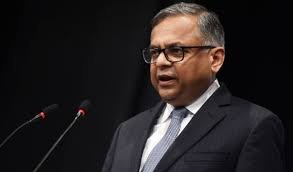N. Chandrasekaran to Chair Tata Electronics: A Boost to India’s Manufacturing Sector
The Indian manufacturing sector is set to receive a significant boost with the appointment of N. Chandrasekaran as the chairman of Tata Electronics. This move comes as a strategic decision to bolster India’s position in the global electronics market and to capitalize on the growing demand for electronic products domestically.
Key Role in Tata’s Ambitious Plans: Chandrasekaran’s appointment as the chairman of Tata Electronics is crucial given his extensive experience and proven track record in steering large organizations towards growth and profitability. As the former chairman of Tata Sons, his strategic vision and leadership skills are expected to play a pivotal role in realizing Tata Electronics’ ambitious plans in the electronics sector.
Focus on Domestic Manufacturing: One of the key objectives of Chandrasekaran’s leadership at Tata Electronics is to enhance domestic manufacturing capabilities. With India’s burgeoning consumer electronics market and the government’s emphasis on initiatives like “Make in India” and “Atmanirbhar Bharat,” there is a pressing need to ramp up local production to reduce dependency on imports.
Opportunities for Employment and Skill Development: The expansion of Tata Electronics under Chandrasekaran’s stewardship is likely to create numerous employment opportunities across various skill levels. Additionally, the company’s focus on indigenous manufacturing will necessitate investments in skill development initiatives to equip the workforce with the required technical expertise.
Potential for Innovation and Technology Integration: Chandrasekaran’s leadership is expected to drive innovation and technological advancements within Tata Electronics. By leveraging Tata Group’s diverse portfolio and global partnerships, the company aims to develop cutting-edge solutions and integrate emerging technologies to cater to evolving consumer needs.
Collaboration for Industry Growth: Chandrasekaran’s appointment underscores Tata Group’s commitment to contributing to India’s economic growth and development. Through collaborative efforts with industry stakeholders, academia, and the government, Tata Electronics aims to foster an ecosystem conducive to innovation, entrepreneurship, and sustainable growth in the electronics sector.

Why this News is Important:
Appointment of Industry Veteran: The appointment of N. Chandrasekaran as the chairman of Tata Electronics holds significant importance for India’s manufacturing landscape. Chandrasekaran’s vast experience and leadership skills are expected to drive Tata Electronics towards becoming a key player in the global electronics market.
Boost to Domestic Manufacturing: Chandrasekaran’s leadership is expected to accelerate Tata Electronics’ efforts in strengthening domestic manufacturing capabilities, aligning with the government’s vision of self-reliance and reducing import dependency in the electronics sector.
Stimulus for Employment and Skill Development: The expansion of Tata Electronics under Chandrasekaran’s leadership is poised to create employment opportunities and foster skill development initiatives, thereby contributing to India’s socio-economic development.
Emphasis on Innovation and Technology: Chandrasekaran’s focus on innovation and technology integration is anticipated to drive Tata Electronics towards developing innovative solutions and staying ahead in the rapidly evolving electronics market.
Collaborative Approach for Industry Growth:Chandrasekaran’s appointment signifies Tata Group’s commitment to collaborating with industry stakeholders and the government to foster an enabling environment for the growth of the electronics sector in India.
Historical Context:
Evolution of Tata Group: Tata Group, founded in 1868 by Jamsetji Tata, has a rich legacy of contributing to India’s industrialization and economic progress. Over the years, Tata Group has diversified its business interests and emerged as a global conglomerate with a presence in various sectors, including steel, automotive, telecommunications, and electronics.
Government Initiatives: The Indian government has been actively promoting initiatives like “Make in India” and “Atmanirbhar Bharat” to boost domestic manufacturing and reduce import dependency across sectors, including electronics. These initiatives aim to foster indigenous production, create employment opportunities, and enhance India’s self-reliance in critical sectors.
Global Electronics Market: The global electronics market has been witnessing rapid growth, driven by technological advancements, changing consumer preferences, and increasing digitization. India, with its large consumer base and growing middle class, presents significant opportunities for electronic manufacturers to tap into the domestic market.
5 Key Takeaways from “N. Chandrasekaran to Chair Tata Electronics”:
| Serial Number | Key Takeaway |
|---|---|
| 1. | Appointment of N. Chandrasekaran as chairman of Tata Electronics signals a strategic move to bolster India’s manufacturing sector. |
| 2. | Chandrasekaran’s leadership is expected to focus on enhancing domestic manufacturing capabilities to reduce dependency on imports and promote self-reliance. |
| 3. | Expansion of Tata Electronics under Chandrasekaran’s stewardship is likely to create employment opportunities and foster skill development initiatives. |
| 4. | Emphasis on innovation and technology integration to develop cutting-edge solutions and cater to evolving consumer needs. |
| 5. | Collaborative efforts with industry stakeholders and the government to foster an enabling environment for the growth of the electronics sector in India. |
Important FAQs for Students from this News
Q: Who is N. Chandrasekaran and why is his appointment significant?
A: N. Chandrasekaran is the chairman of Tata Electronics and his appointment is significant due to his extensive experience and leadership skills, which are expected to drive growth in India’s manufacturing sector.
Q: How does Chandrasekaran’s leadership impact Tata Electronics’ focus on domestic manufacturing?
A: Chandrasekaran’s leadership is expected to accelerate Tata Electronics’ efforts in strengthening domestic manufacturing capabilities, aligning with initiatives like “Make in India” and “Atmanirbhar Bharat.”
Q: What opportunities does the expansion of Tata Electronics under Chandrasekaran’s leadership bring?
A: The expansion of Tata Electronics is poised to create employment opportunities and foster skill development initiatives, contributing to India’s socio-economic development.
Q: What is the significance of innovation and technology integration under Chandrasekaran’s leadership?
A: Chandrasekaran’s focus on innovation and technology integration is expected to drive Tata Electronics towards developing cutting-edge solutions to cater to evolving consumer needs.
Q: How does Chandrasekaran plan to foster industry growth through collaboration?
A: Chandrasekaran aims to collaborate with industry stakeholders and the government to create an enabling environment for the growth of the electronics sector in India.
Some Important Current Affairs Links













